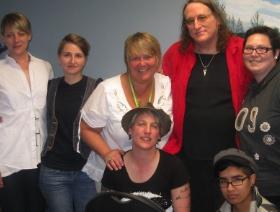Vancouver’s Dyke March has a full slate of directors and is preparing for a successful year, says the organization’s president.
Last year, financial instability and a lack of community interest and participation put the organization’s annual women-focused march and festival in jeopardy. But any uncertainty the organization faced a year ago has been replaced with a new resolve, thanks to community fundraising and a large board of nine directors, president Theresa Wilson told attendees at the April 22 annual general meeting.
Only a dozen people attended the meeting, half of them board members.
On the 2012 board are Wilson, Michelle Fortin, Emily Plommer, Mariegold Rondeau, Danielle Macdonell, Justin Hur, Alexis Bremner, Marienela Ramos Capelo and Heather Buller.
“I volunteered last year and I wanted to do more, so I was asked to join the board,” says Buller, who thinks the Dyke March/Festival is an important event in a community lacking women-focused celebrations.
“As queer women we don’t have that many celebrations, so it’s nice to really bring the community together and have events,” she says.
This year’s march/festival will take place on Saturday, Aug 4 at the recently renovated Grandview Park on Commercial Dr. Organizers say the festival will showcase live entertainment and booths set up by women-friendly organizations and businesses in the community.
“We are going to have a small sort of alley of women-friendly, women-centric organizations explaining what they do and what they can provide for women and their families in the community,” Fortin says.
Organizers are also hoping to add a beer garden to this year’s festival. Fortin says the board has applied for a liquor permit and is waiting for approval. She hopes a beer garden will generate a little extra revenue for the festival.
The Dyke March society lost almost $7,000 in 2010, though revenues exceeded expenses in 2011 by $1,346.
Fortin notes that the board did not apply for a $4,500 special events grant from the city last year. “I want to be clear that the city didn’t stiff us,” Fortin told the meeting. “As a board we didn’t know if there was going to be an event and we didn’t feel, in good conscience, that we could apply for a grant if we didn’t know whether we could hold an event.”
Confronted by financial troubles and dwindling community interest, the board held a town-hall meeting last spring. Community members rallied, people joined the board and more than $9,000 was raised.
The society’s 2011 financial records indicate that, of the funds raised, $5,300 was collected through fundraising events, $1,762 came from personal donations and $2,000 was provided in-kind from the Vancouver Pride Society (VPS).
The VPS was “very generous to us last year,” Fortin says, citing the tents, sound system and other equipment it donated to the festival.
Fortin says the VPS won’t donate supplies again this year, but it has invited Dyke March organizers to order equipment through them to keep their costs low.
“The Dyke March is a partner organization with the VPS and we definitely support each other,” VPS president Tim Richards tells Xtra via email.
The Dyke March continues to host fundraising events, such as the popular Diva’s Den and another Powerful Out Women forum, this time focusing on queer women in business. And this year the organization has applied for a city grant, Fortin adds.
City spokesperson Wendy Stewart says special event grant applications go before city council on May 2.

 Why you can trust Xtra
Why you can trust Xtra


